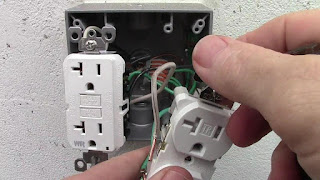 |
| How many European homeowners will you find wielding one of these? |
Most of all, we Americans love to fiddle with our own homes. While that may not seem like a big deal to you, believe me, it is: you’d be hard-pressed to find a Parisian with a Skilsaw in his hand. In Europe, Asia, and in most other places, it wouldn’t even occur to people to attempt an unfamiliar job when there was a specialist around to do it for them.
 |
| Framing is relatively easy, and the results are gratifyingly visible. |
Still, as that sage Dirty Harry once observed: “A man’s got to know his limitations.” (I expect he meant women too). Some projects may simply not be worth your while—not because they’re beyond your abilities, but because their learning curves are too steep to be mastered in one project. Having tried my hand at just about every trade except laying carpet, here’s my personal rundown on what’s worth your time and what isn’t:
 |
| Don't take DIY electrical work too lightly— one wrong move, and ZAP! (Image courtesy of Sparky Channel) |
• Framing basics can be picked up in a fairly short time, and the results are gratifyingly visible. Unlike concrete work, framing is also manageably paced—you can take it as fast or as slowly as you like. However, make very sure you’re conversant with a spirit level, or you’ll be fighting crooked walls and floors for the balance of the project.
 |
| Taping drywall is as much an art as it is a craft. Some folks have what it takes, and some don't. Do a couple of walls for practice so you can find out which side you're on. |
• Rough plumbing and electrical work are only so-so candidates for DIY. It’s not the physical work that’s difficult; it’s knowing what goes where. Plumbing and electrical codes are complicated, and and mistakes can be costly—sometimes even deadly. Proceed with caution.
• Insulation work is easily accomplished by a handyperson, though it’s among the most unpleasant of all construction jobs: Those devilish little fibers find their way everywhere. Consider using one of the newer non-fiberglass "green" insulation materials, but in any case, don’t fail to wear the appropriate protective clothing and breathing apparatus.
 |
| Unless you're a really good amateur painter, don't risk ruining the most conspicuous part of your project. A beautiful paint job can make all the difference. (Image courtesy metcalfpainting.com) |
• Taping and texturing is equal parts of skill and art, and for practical purposes, a botched job is irreversible. Hang the drywall if you must, but be leery of on-the-job training in taping and texturing the walls and ceilings. If you’re really fired up about doing your own, do yourself a favor and practice on garage or closet walls and ceilings before you attack the really conspicuous stuff.
• Painting is a trade that many attempt but few master. And unfortunately, unlike many other phases of construction, a lousy paint job won't be hidden by succeeding work. I’ve seen lots of otherwise stellar DIY projects utterly ruined at the last minute by paint-splattering maniacs—so unless you’re truly handy with a brush, swallow your pride, open your wallet, and hire a pro. It’s a final touch that can make a big difference.
No comments:
Post a Comment